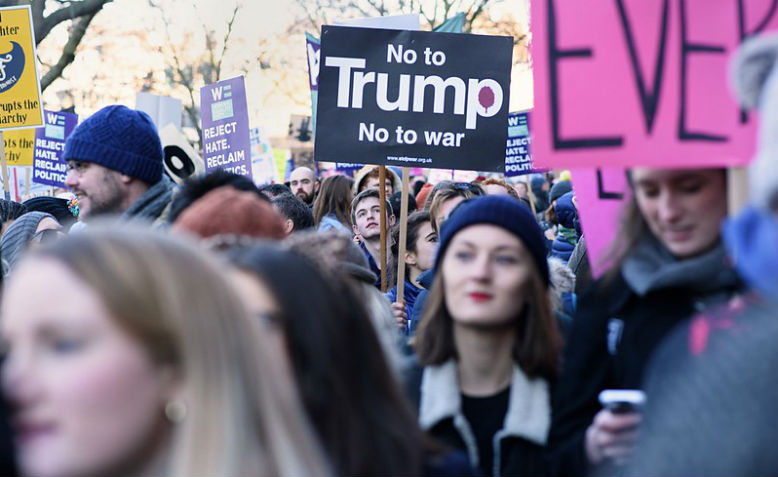 Women's March in London, January 2017. Photo: Jim Aindow
Women's March in London, January 2017. Photo: Jim Aindow
Trump’s meddling can be beaten with protest, writes Lindsey German
Donald Trump decided to intervene in the British election before it has even formally begun. And guess how he chose to do it? By taking part in a phone in with Brexit party leader Nigel Farage. Trump’s message was that Farage and Johnson had to get together in order to create a right-wing block and that people shouldn’t vote for Corbyn because he was bad for the country.
This is a completely unwarranted and undemocratic interference in British politics, but if I were Corbyn I would take it as a compliment. Trump’s impact on politics has been wholly negative, ushering in a rule of brutal racist scapegoating of migrants, heralding new levels of Islamophobia, and demanding that countries allied to the US through NATO pay more on military spending at the expense of their public services. His unpopularity among British people can only help Labour.
So far, Farage has failed to take Trump’s advice, demanding a pact with the Tories and withdrawing his Brexit deal, or the Brexit party will contest every seat. But what the episode does show is that Trump wants the ‘special relationship’ which is firmly rooted in the politics of the far right.
Britain’s special relationship has endured successive presidents and prime ministers in the past decades, most toxically in the joint enterprise between Bush and Blair which took us into the illegal war in Iraq. While Trump based some of his pre-election appeal on ending wars that America couldn’t win (!), he has in practice found himself embroiled in a series of wars, with US backing for the Saudi war in Yemen, troops in Syria and Iraq, and an escalation of conflict with Iran.
Trump regards both Johnson and Farage as political allies but he and they face major problems. Britain is facing the reality of its much-reduced place in the world post empire which is brought into sharp relief by Brexit. Meanwhile the US is also trying to come to terms with its declining role. While it is by far the largest military power in the world it faces increasing competition especially from China.
This is therefore a dangerous moment, and one where we desperately need an anti-war government. The election will be closely fought, and we have not heard the last of Trump. Just a week before the election, on December 3rd, Trump will be in Britain for a NATO leaders’ summit and will be again hosted by the queen in Buckingham Palace. He and Johnson will be met with mass protests on that day, saying that he and NATO are not welcome here.
If an anti-war government is to mean anything, it needs to confront the growing militarism and expansionism of NATO, especially in Eastern Europe. It also needs to oppose the intervention if Turkey – a NATO member – against the Kurds in Syria. Trump has a massive audience online, but he is vulnerable to protest. And this is an election intervention we can’t miss.
Join the national demonstration: No to Trump – No to NATO

